INTRODUCTION
This pilot project titled – “Paddy organic chain from seed to market: A pilot project in Tamil Nadu” was implemented in four villages of Kancheepuram district of Tamil Nadu during the period of October 2005 – March 2009 with support from Hivos, Bangalore. The project covers all components of the paddy organic chain – from seed to market.
OBJECTIVES
- Empower paddy farmers through organic farming and enhance their livelihoods and food security.
- Address all links of the paddy value chain from seed to market.
- Make organic farming sustainable by providing a strong support for marketing and certification.
WORK DONE UNDER THE PROJECT
- To empower and build the capacity of farmers training programmes on organic farming technologies, organic certification procedures and on several general topics were provided. Leadership trainings also formed part of it. Several exposure visits were organized for farmers to visit successful practitioners of organic farming and also to learn about latest organic farming technologies.
- The organic farming producers’ societies registered in Kancheepuram and Thiruvannamalai has empowered the farmers. Most of the marketing efforts are currently taken on by the members of the society themselves. A marketing company by name “Arogyam Organics Private Limited” has been registered for marketing purposes.
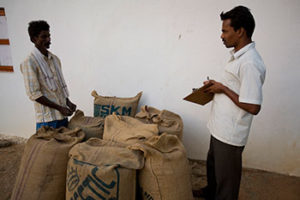
Buying officer – buying organic produce after checking yield estimate
- Farmers were successfully completed the conversion period. All the products cultivated by the beneficiaries of this project are labelled “organically certified” from April 2008 onwards.
- To raise sufficient consumer awareness about organic farming and its benefits we participated in several agricultural fairs, workshops and meetings.
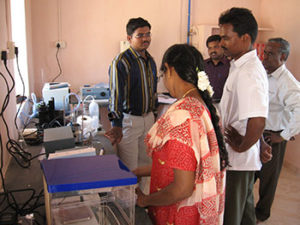
CIKS staff participating in demonstration of soil testing
- Experiments were conducted in crops in paddy and groundnut to find ways of enhancing the phosphate content in the soil through organic manures. This study was taken up as the addition of phosphate to the soil organically is a major challenge.
- To facilitate the processing of organic paddy and groundnut kernels without contamination of chemical produce a small scale paddy processing unit and a groundnut decorticator unit were established.
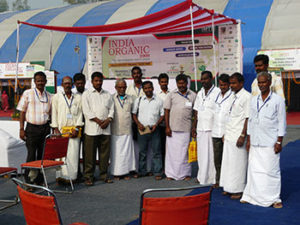
Farmers participating in IOTF 08
- A soil testing laboratory was established in our experimental farm at Sukkankollai. Our technical staff were trained on soil sampling, testing and analysis. Parameters such as pH status, electrical conductivity, organic carbon percentage and available NPK content of the soil are analyzed here.
- Common storage structures were constructed in three villages to enable farmers to protect their agricultural produce.
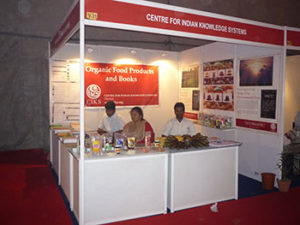
Our stall in India organic trade fair’08 held at New Delhi
- Case studies of successful farmers of this project have been documented and published in the form of a book. A training kit for Internal Control Systems for group certification was developed in Tamil in consultation with farmers.
- Our staff participated in many national and international seminars, workshops, trainings and exhibitions. Apart from these several capacity building workshops were also organized for the staff members.
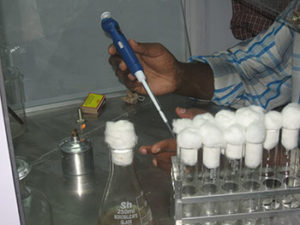
Liquid culture being Innoculated using micropipette
- Organic farming mainly depends on the fertility of the soil and it is very important to monitor the quality and health of the soil frequently.
- Awareness and advocacy material for promotion of organic farming in the form of posters and books were prepared.
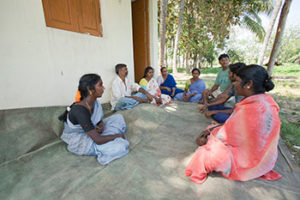
Small holder farmers group – meeting
- Workshops were conducted to provide our staff and farmers an overview regarding the three major laws pertaining to our work namely the Biodiversity Act, the Protection of Plant Varieties and Farmers Rights Act and the Seed Act with its proposed new amendments.
- Four brainstorming sessions on ways to implement organic farming successfully in Tamil Nadu was conducted in the district of Kancheepuram, Thiruvannamalai, Nagapattinam and Tirunelveli.
- Several studies on organic marketing and status of organic enterprises, retail chains and their impact on unorganized sector were conducted. A business plan was prepared.
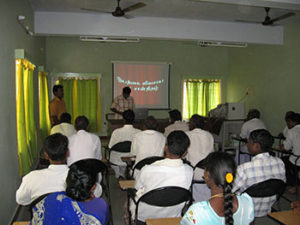
TTP training on organic farming
